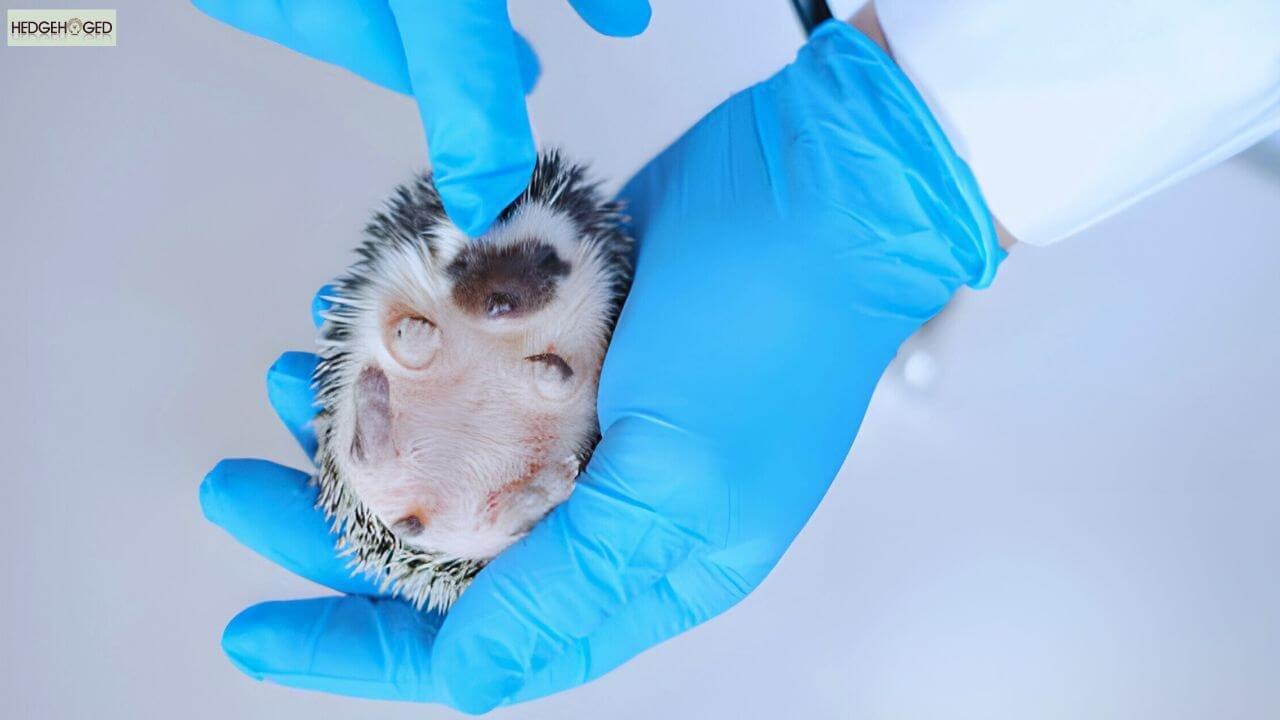Hedgehogs are interesting and charming animals that may make loyal owners enjoy their company, despite their occasional prickliness. Even the most experienced owner may find health problems with their spiky companions to be upsetting and distressing.
Wobbly hedgehog syndrome (WHS) is one of the distinctive health problems that hedgehogs face, making them unique pets.
A common dread among owners is wobbly hedgehog syndrome. Sadly, receiving a WHS diagnosis is not good news. However, what precisely is it? And if your hedgie pet is diagnosed with it, what can you do?
Several owners are not particularly knowledgeable about these things. In addition, there’s a lot of false information about wobbly hedgehog syndrome floating around.
When it comes to shaky hedgehog syndrome, this guide will be your only resource. If your poor hedgie gets WHS, you’ll find out what it is and what to do next.
What Is Wobbly Hedgehog Syndrome?
Hedgehogs are specifically affected by the quite nasty degenerative neurological condition known as “wobbly hedgehog syndrome.” There isn’t a cure as of now.
Known by another name, demyelinating paralysis, wobbly hedgehog syndrome is a degenerative condition that affects around one in ten hedgehogs. Unfortunately, because of the effects it exerts on the brain, it eventually results in death and paralysis.
It is categorized as a neurological condition that impacts a hedgehog’s brainstem, spinal cord, cerebellum, and cerebrum.
Fundamentally, WHS is similar to human multiple sclerosis in many ways. It’s unclear, yet, what specifically causes wobbling hedgehog syndrome. Although there are several theories suggesting a genetic connection, no concrete evidence has been found to support them.
A different explanation about the possible etiology of wobbly hedgehog syndrome is the possibility of dietary influences. This is partially because some vitamin supplements can momentarily alleviate symptoms. Once more, solid proof of this has not yet been discovered.
Additionally, shaky hedgehog syndrome usually manifests in two- or three-year-old hedgehogs. Although it doesn’t only happen to people in this age range, that is when the great majority do.
Unfortunately, there aren’t many resources available for study and prevention when it comes to pet diseases. The likelihood of a cure is then further delayed when you combine that with the special difficulties that neurological diseases present.
Wobbly Hedgehog Syndrome Early Signs
The name “wobbly hedgehog syndrome” refers to the peculiar wobble that hedgehogs with this illness frequently exhibit, even when they are motionless. Changes in the brain and spinal cord can result in muscle weakness and a variety of other neurological indicators, but your pet may also exhibit additional symptoms.
Neurological deterioration may be accompanied by behavioral abnormalities, including hostility. Hedgehogs can have appetite loss, trouble swallowing food and liquids, poop and stool retention, and weight loss.
All of these indicate that its system is malfunctioning. As WHS worsens, paralysis is most likely to occur, and death is certain.
- A shaky walk or the sensation of trembling even when still.
- Unable to synchronize motions.
- Having trouble standing and frequently toppling over.
- The hedgehog’s inability to shut its hood—a helmet meant to shield its eyes—is among the first symptoms of WHS.
However, there are several possible causes for similar symptoms.
Why Is My Hedgehog Wobbling?
There may be a cause for concern if you observe your hedgehog wobbling during its walks. Its wobbling could indicate an inside medical issue.
The disorder known as Wobbly Hedgehog Syndrome (WHS) is one of the most frequent causes of hedgehog wobbling. They have a neurological illness that makes it difficult for them to move steadily. Small symptoms of difficulty walking may be the first, and they may develop worse with time.
A hedgehog may occasionally wobble due to an injury or mishap. Because hedgehogs are inquisitive animals, they could explore excessively and get hurt. Their equilibrium may become unstable if they trip, fall, or collide with something hard.
An infection in the ear is another potential cause of wobbling. Hedgehogs’ ability to balance and move around may be impacted by ear infections.
A hedgehog may wobble for many reasons, including illnesses, infections, or even aging. Their neurological system may be interfered with by certain diseases or poisons, resulting in wobbling.
If you observe your hedgehog wobbling or acting abnormally, you must take it to the veterinarian. The veterinarian can diagnose the condition and treat your hedgehog. Early intervention can significantly improve your hedgehog’s mobility and quality of life.
Diagnosing Wobbly Hedgehog Syndrome
If you are concerned that your hedgehog may have WHS, consult a veterinarian. A WHS diagnosis may be suspected based on physical exam findings and a history of symptoms at home.
Your veterinarian may also order blood tests or X-rays to rule out other potential causes of neurologic symptoms in hedgehogs, such as brain tumors, intervertebral disc disease, or hepatic encephalopathy.
A conclusive diagnosis of WHS can only be obtained after death when a microscopic examination of the brain and spinal cord reveals distinctive spongy changes.
Most hedgehogs with shaky hedgehog syndrome are diagnosed based on their symptoms while living. Blood tests to assess kidney, liver, and bladder health, as well as X-rays, are routinely used to determine whether other diseases are present, but there is no test to specifically identify WHS.
Once a hedgehog dies, an autopsy can be performed to determine whether it had WHS. A biopsy of brain tissue can be performed, and specific stains can be used to detect the lesions caused by wobbling hedgehog syndrome.
Wobbly Hedgehog Syndrome When to Euthanize
Choosing when to euthanize a hedgehog with Wobbly Hedgehog Syndrome (WHS) is a difficult decision for any pet parent. To make the greatest decision for your hedgehog’s health, consider several variables.
One important consideration is the hedgehog’s quality of life. If the hedgehog is in extreme discomfort, or distress, or has a considerable loss of mobility that cannot be properly managed, euthanasia may be considered to avoid further suffering.
Observing the hedgehog’s activity and overall demeanor can reveal information about its comfort and pleasure.
Another issue to consider is the amount of care required to keep the hedgehog’s quality of life. As WHS advances, hedgehogs may require more assistance with basic functions including eating, drinking, and moving.
It is critical to contact a skilled veterinarian who can offer advice and support throughout this tough decision-making process.
Finally, the choice to euthanize a hedgehog with WHS is extremely personal and should be taken after careful evaluation of the hedgehog’s quality of life and well-being.
Wobbly Hedgehog Syndrome Life Expectancy
There are no treatments or cures for WHS. An infected hedgehog is predicted to die within 18-24 months of the onset of clinical symptoms. During that time, supportive care can assist in reducing the obstacles the hedgehog is facing, such as using towels to keep him/her upright and making food and water bowls.
As the condition worsens, the hedgehog’s quality of life must be evaluated, and euthanasia may be the only compassionate solution. Breeding hedgehogs suspected of having WHS is never encouraged.
What to Do if Your Hedgehog Has Wobbly Hedgehog Syndrome
There is currently no viable treatment for hedgehogs with WHS. Vitamin supplements, antibiotics, steroids, acupuncture, and physical therapy have all been tried as treatments for WHS.
Unfortunately, these therapeutic alternatives have not been effective in halting the advancement of paralysis caused by this illness. Care for hedgehogs with this ailment is primarily supportive, and may include techniques customized to their unique symptoms:
- Keeping food and water within easy reach of hedgehogs with trouble moving around.
- Keeping the cage warm, clean, and dry.
- Keeping them protected from falls in case they lose their equilibrium.
- Bathe them if they get dirty.
- Use towels or other soft bedding to keep them upright.
How to Prevent Wobbly Hedgehog Syndrome
A hedgehog should not be bred if it exhibits WHS symptoms. The greatest method to stop a hedgehog with WHS from passing on these genes to its progeny is to make sure the sickness doesn’t affect them as genetics is most likely the cause of this terrible disease.
FAQs
Q1. Is it common for hedgehogs to wobble?
No, hedgehogs don’t normally wobble. If you find your hedgehog wobbling, it could indicate an underlying health problem, such as Wobbly Hedgehog Syndrome (WHS) or an injury.
Q2. What are the initial indicators of Wobbly Hedgehog Syndrome?
The initial symptoms of Wobbly Hedgehog Syndrome may include an unsteady walk, difficulty standing, difficulties synchronizing movements, and an inability to seal their eye covers (hood).
Q3. What’s the cause of Wobbly Hedgehog Syndrome?
The specific cause of Wobbly Hedgehog Syndrome remains unknown, but it is considered a degenerative neurological condition. Genetic variables and probable dietary implications have been proposed, however further research is required to confirm.
Q4. Does the Wobbly Hedgehog Syndrome hurt?
Although Wobbly Hedgehog Syndrome is not usually painful, affected hedgehogs may feel uncomfortable because of weakness in their muscles and decreased mobility.
Q5. What is the duration of Wobbly Hedgehog Syndrome?
Most hedgehogs who are diagnosed with Wobbly Hedgehog Syndrome pass away from the condition within 18 to 24 months of exhibiting clinical signs, meaning that their life expectancy is usually shortened.
Conclusion
Writing this up was a huge pain in the ass. It is enough to make anyone miserable to consider the unfortunate hedgehogs who must endure this. However, the correct information regarding wobbling hedgehog syndrome must be available, and we believe that this guide has achieved that goal. You ought to be well-informed on WHS by this point, as well as the symptoms and actions to take upon diagnosis. We sincerely hope you never have to deal with this. But in our opinion, you should be ready in case that moment ever arrives.
Read Also: Wobbly Hedgehog Syndrome Symptoms






